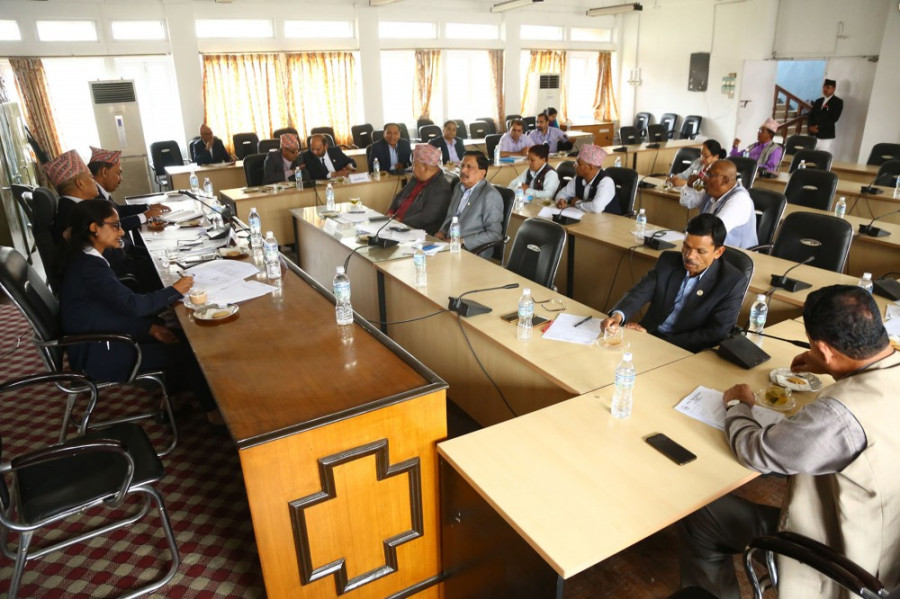National
Public Accounts Committee puts a halt to the security printing project
The committee was considering forming a subcommittee to advise the government on ways to move forward but a corruption scandal involving a sitting minister has put the brakes on the project.
Anil Giri
The much-hyped security printing press has hit a roadblock, as the Parliamentary Accounts Committee on Thursday directed the government not to proceed with the plan.
After discussing the plan with officials at the Ministry of Communication and Information Technology, committee members said they were not satisfied with the replies furnished by the officials.
Minister for Communication and Information Technology Gokul Baskota was not present at the meeting. Baskota resigned as minister on Thursday afternoon after an audio recording was leaked in which he is heard negotiating a Rs700 million “commission” with the local agent of a Swiss company with regards to setting up the security printing press.
The House committee has been studying documents related to the government’s plan for over a month.
A committee member said that after the audiotape was released on Wednesday evening the committee had an easy decision to halt the process, at least for now.
“The procurement process became more complicated after the audiotape was released,” said Dharmasheela Chapagain, a member of the Public Accounts Committee. “We were in the process of forming a subcommittee to recommend measures to the government but we did not think that this process had such a serious corruption issue.”
However, officials at the Ministry of Communication and Information Technology said that they had already stopped the process of negotiating a government-to-government deal after the House panel asked them to furnish the details of correspondence between them and two international firms.
“We are happy with the decision because we shared all the documents that we had,” said Dipak Subedi, secretary at the ministry. “As soon as the issue landed at the House committee, we had stopped all kinds of correspondence and negotiations with interested parties. Now we have no options left besides what the House panel directs us later,” said Subedi.
According to the documents obtained by the Post, the Public Accounts Committee asked senior government officials eight questions regarding the printing press procurement process. The questions regarded Cabinet decisions and the visits of Baskota and other senior officials to France and Germany in the name of a study tour.
The House panel also asked the government what prevented them from procuring the press through global competition and why they had only corresponded with two countries—Germany and France—for letters of intent. While the government had initially signed an MoU with France in March last year regarding the setting up of the press, a competing bid from Germany had complicated matters.
A Swiss company, KBA-NotaSys, had also thrown its hat in the ring.
These three proposals—from Germany, France and Switzerland—were forwarded by their respective embassies in Kathmandu, not their governments.
The House panel voiced its concern regarding the ministry’s selective approach with French and German firms, disregarding proposals from Poland and Switzerland.
On July 5, 2019, the Polish Embassy in New Delhi had written to Prime Minister KP Sharma Oli and offered a proposal to set up a security printing facility in Nepal, saying that PWPW SA, a Polish government undertaking, was interested in the project.
KBA-NotaSys had sent two letters to the ministry, offering to set up the facility at a cost of 200 million euros.
The ministry, however, failed to seek further details from the Polish or Swiss company.
According to the parliamentary committee, Germany’s Veridos has offered to set up the printing facility for 300 million euros while France’s IN Group has quoted 295 million euros.
All proposals will provide soft loans to the government but the Cabinet has decided that the Finance Ministry will come up with the funds on its own.
In both French and German proposals, they have proposed soft loans guaranteed by the export credit agency and not by their respective governments.
“The investment modalities should be different but the [Nepal] government did not look into it,” a committee member said. “Both French and German proposals have also failed to mention what kind of e-passports they are offering to Nepal or how many pages they will contain, or even whether they comply with and meet International Civil Aviation Organization and ISO standards.”




 19.12°C Kathmandu
19.12°C Kathmandu














